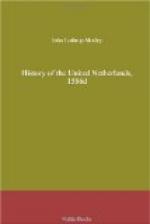Edward Norris—so soon as might be afterwards—sent a cartel to the Count, demanding mortal combat with sword and dagger. Sir Philip Sidney bore the message. Sir John Norris, of course warmly and violently espoused the cause of his brother, and was naturally more incensed against the Lord Marshal than ever, for Sir William Pelham was considered the cause of the whole affray. “Even if the quarrel is to be excused by drink,” said an eye-witness, “’tis but a slender defence for my Lord to excuse himself by his cups; and often drink doth bewray men’s humours and unmask their malice. Certainly the Count Hollock thought to have done a pleasure to the company in killing him.”
Nothing could be more ill-timed than this quarrel, or more vexatious to Leicester. The Count—although considering himself excessively injured at being challenged by a simple captain and an untitled gentleman, whom he had attempted to murder—consented to waive his privilege, and grant the meeting.
Leicester interposed, however, to delay, and, if possible, to patch up the affair. They were on the eve of active military operations, and it was most vexatious for the commander-in-chief to see, as he said, “the quarrel with the enemy changed to private revenge among ourselves.” The intended duel did not take place; for various influential personages succeeded in deferring the meeting. Then came the battle of Zutphen.
Sidney fell, and Hollock was dangerously wounded in the attack which was soon afterwards made upon the fort. He was still pressed to afford the promised satisfaction, however, and agreed to do so whenever he should rise from his bed.
Strange to say, the Count considered Leicester, throughout the whole business, to have taken part against him.
Yet there is no doubt whatever that the Earl—who detested the Norrises, and was fonder of Pelham than of any man living—uniformly narrated the story most unjustly, to the discredit of the young Captain. He considered him extremely troublesome, represented him as always quarrelling with some one—with Colonel Morgan, Roger Williams, old Reade, and all the rest—while the Lord Marshal, on the contrary, was depicted as the mildest of men. “This I must say,” he observed, “that all present, except my two nephews (the Sidneys), who are not here yet, declare the greatest fault to be in Edward Norris, and that he did most arrogantly use the Marshal.”
It is plain, however, that the old Marshal, under the influence of wine, was at least quite as much to blame as the young Captain; and Sir Philip Sidney sufficiently showed his sense of the matter by being the bearer of Edward Norris’s cartel. After Sidney’s death, Sir John Norris, in his letter of condolence to Walsingham for the death of his illustrious son-in-law, expressed the deeper regret at his loss because Sir Philip’s opinion had been that the Norrises were wronged. Hollock had conducted himself like a lunatic, but this he was apt to do whether in his cups or not. He was always for killing some one or another on the slightest provocation, and, while the dog-star of 1586 was raging, it was not his fault if he had not already despatched both Edward Norris and the objectionable “Mr. P. B.”




